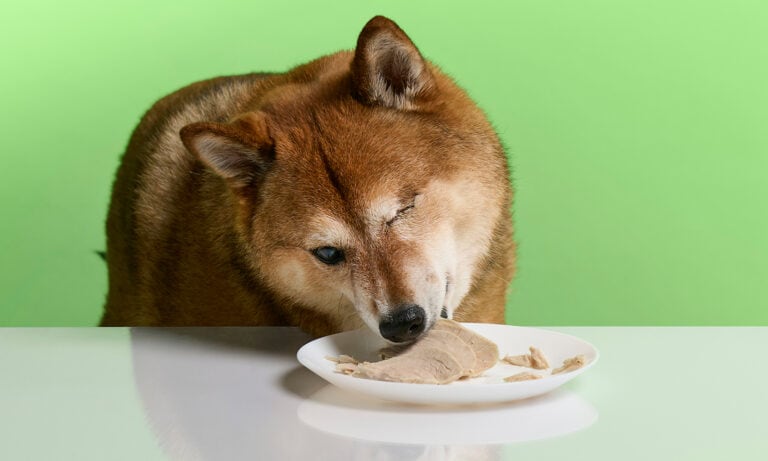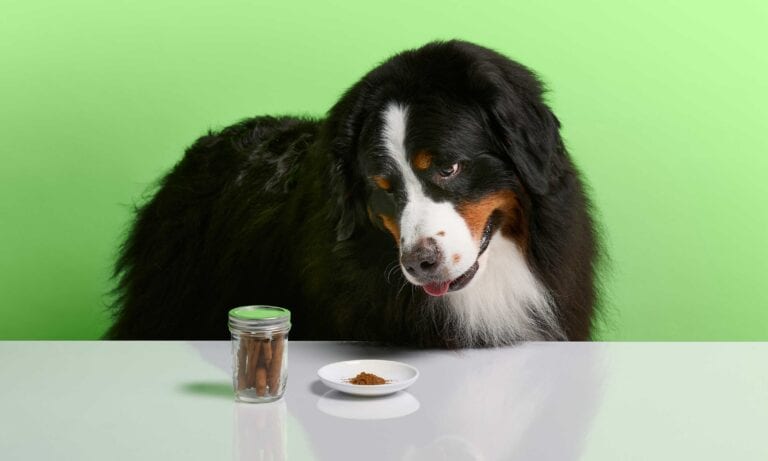Is there a spice cozier than cinnamon? The popular seasonal spice is perfect for making comforting hot drinks and scrumptious baked goods. As you prepare yourself a hot apple cider and cinnamon buns, your sweet pup’s pleading face may make you wonder, "Can dogs have cinnamon, too?"
The short answer: Yes, dogs can have cinnamon—but only in small amounts. Cinnamon has low levels of coumarin, making the list of herbs and spices dogs can have—but only in small doses.
We spoke with a veterinary expert on the safety of cinnamon; its benefits and risks; how to safely offer it to your pup; and what to do if your dog eats too much of it.
Consult your veterinarian before incorporating new foods into your dog’s diet.
Expert input provided by Dr. Ray Spragley, DVM, CVA, CCRT, veterinarian and owner at Zen Dog Veterinary Care in Tuckahoe, New York.
Can Dogs Have Cinnamon?
Click to jump to each section.
Is Cinnamon Toxic to Dogs?
Unlike some spices, cinnamon (Cinnamomum zeylanicum) is considered nontoxic to dogs. There are two popular types of cinnamon: cassia cinnamon and ceylon cinnamon. Between the two, ceylon cinnamon contains less coumarin and is safer for dogs to consume.
Regardless, cinnamon should only be given in very small amounts with your canine companion’s pet food or other dog-friendly human foods. In large amounts, cinnamon can pose several risks to dogs (which we get into below), says Dr. Ray Spragley, DVM, CVA, CCRT, veterinarian and owner at Zen Dog Veterinary Care in Tuckahoe, New York.
When offering cinnamon to your furry friend, use only plain ground cinnamon. This is especially important, as other seasonings and ingredients can be harmful to dogs.
Nutmeg, often used in conjunction with cinnamon, is a common spice that’s highly toxic to dogs. Nutmeg contains the compound myristicin, which can cause symptoms such as:
- Dry mouth
- Abdominal pain
- Tremors
- High blood pressure
- Disorientation
- Seizures
Other spices that are toxic to dogs and should be avoided include:
- Garlic powder
- Cocoa powder
- Oregano
- Onion powder
- Mint
A few spices that are safe for dogs include:
- Ginger
- Turmeric
- Rosemary
- Parsley
How Much Cinnamon Can I Give My Dog?
Want to top off your dog’s meal with a dash of cinnamon or bake them homemade dog treats?
Dr. Spragley shares a breakdown of about how much cinnamon to give a dog per serving based on size:
- Extra small to small (0–20 pounds): Less than 1/2 teaspoon
- Medium (20–60 pounds): Less than 3/4 teaspoon
- Large (60 pounds and up): 1 teaspoon
As with every extra little treat, it’s best to give this spice in moderation: no more than one teaspoon of cinnamon depending on your dog’s size.
You can take the guesswork out of how much to give your canine companion by also giving them store-bought, dog-friendly cinnamon treats.
What Are the Dangers of Giving My Dog Cinnamon?
The amount will vary depending on their size. Dr. Spragley says this can be a little over 1 teaspoon for small dogs who weigh up to 20 pounds and more than 5–6 teaspoons for large dogs who weigh at least 60 pounds.
He adds that each dog may react differently to a large amount, with some having no issues at all.
An unmeasured amount of cinnamon greater than 1 teaspoon can cause the following symptoms:
- Vomiting
- Diarrhea
- Mouth irritation
- Lung irritation
- Coughing
- Difficulty breathing
- Stomach irritation
- Changes in heart rate
In very large doses, cinnamon can cause liver disease and low blood sugar levels (hypoglycemia). Dr. Spragley recommends dogs with respiratory issues avoid cinnamon entirely, as it may exacerbate breathing issues if they were to inhale it.
Like other essential oils, cinnamon oil is extremely toxic to dogs and can cause toxicity through ingestion or skin contact. Cinnamon sticks and cinnamon powder should also be avoided since they can cause mouth and skin irritation. If your dog ingests cinnamon essential oil, or large amounts of cinnamon sticks or cinnamon powder, consult a vet immediately.
What Do I Do If My Dog Eats Too Much Cinnamon?
If your dog eats too much cinnamon, contact the following immediately:
- Your vet
- The Pet Poison Helpline (855-764-7661; a fee may apply)
- The ASPCA’S Animal Poison Control Center (888-426-4435; a fee may apply)
- Chewy’s Connect With a Vet (via a live chat link or video; fees may apply)
By consulting a vet, you’ll receive guidance on whether to bring your dog in for treatment ASAP or wait to see if they have symptoms. See a vet for treatment right away if your dog is having diarrhea or vomiting.
What Are the Benefits of Cinnamon for Dogs?
While there’s evidence of cinnamon having health benefits for humans, it’s limited when it comes to our canine companions.
Cinnamon is thought to have the following health benefits:
- Anti-inflammatory properties, which can help with joint pain, muscle soreness and arthritis
- Antibacterial and antifungal properties
- Helping insulin sensitivity and lowering glucose levels, which could aid in diabetes management
- Acting as a fairly potent antioxidant
- Aiding with digestive issues
- Promoting heart health
As with every new food, it’s always best to consult with your vet to learn if cinnamon is an appropriate inclusion in your dog’s diet.
FAQs About Cinnamon and Dogs
Q:
Can a pet parent sprinkle cinnamon on their dog's food?
Q:
Can dogs eat cinnamon rolls?
Q:
Can dogs have cinnamon applesauce?
Q:
Can dogs have cinnamon sugar?
Q:
Can you bake with cinnamon for dogs?
MORE ABOUT WHAT DOGS CAN EAT:
Share:
















